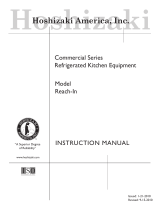The appliance should be destined only to
the use for which it has been expressly
conceived. Any other use should be
considered improper and therefore
dangerous. The manufacturer cannot be
held responsible for injury or damage
resulting from improper, incorrect, and
unreasonable use. Failure to install,
operate, and maintain the appliance in
accordance with this manual will adversely
affect safety, performance, component life,
and warranty coverage.
To reduce the risk of death, electric
shock, serious injury, or fire, follow
basic precautions including the
following:
• Only qualified service technicians should
install and service the appliance.
• Wear appropriate personal protective
equipment (PPE) when servicing the
appliance.
• The appliance must be installed in
accordance with applicable national,state,
and local codes and regulations.
• Appliance is heavy. Use care when
lifting or positioning. Work in pairs when
needed to prevent injury or damage. Do
not lift using the top section or the doors.
• To reduce the risk of electric shock, do not
touch the plug with damp hands.
• Unplug the appliance before servicing.
• The appliance requires an independent
power supply of proper capacity. See the
nameplate for electrical specifications.
Failure to use an independent power
supply of proper capacity can result in a
tripped breaker, blown fuse, damage to
existing wiring, or component failure. This
could lead to heat generation or fire.
• Children should be properly supervised
around the appliance.
• Do not climb, stand, or hang on the
appliance or doors or allow
children or animals to do so. Do not climb
into the appliance or allow children or
animals to do so. Death or serious injury
could occur or the appliance could be
damaged.
• Be careful not to pinch fingers when
opening and closing the doors. Be careful
when opening and closing the doors or
when children are in the area.
• Open and close the doors and with care.
Opening the doors too quickly or forcefully
may cause injury or damage to the
appliance or surrounding equipment.
THE APPLIANCE MUST BE
GROUNDED. The appliance is equipped
with a NEMA 5-15 three‑prong grounding
plug to reduce the risk of potential shock
hazards. It must be plugged into a properly
grounded, independent 3-prong wall outlet. If
the outlet is a 2-prong outlet, it is your
personal responsibility to have a qualified
electrician replace it with a properly
grounded, independent 3-prong wall outlet.
Do not remove the ground prong from the
power cord and do not use an adapter plug.
Failure to follow these instructions may result
in death, electric shock, or fire.
• Do not use an extension cord.
• Do not use an appliance with a damaged
power cord. The power cord should not be
altered, jerked, bundled, weighed down,
pinched, or tangled. Such actions could
result in electric shock or fire. To unplug
the appliance, be sure to pull the plug, not
the cord, and do not jerk the cord.
• The GREEN ground wire in the
factory‑installed power cord is connected
to the appliance. If it becomes necessary
to remove or replace the power cord, be
sure to connect the power cord's ground
wire.
• Do not splash, pour, or spray water
directly onto or into the appliance. This
might cause short circuit, electric shock,
corrosion, or failure.
• Do not make any alterations to the
appliance. Alterations could result in
electric shock, injury, fire, or damage to
the appliance.
• The appliance is not intended for use by
persons (including children) with reduced
physical, sensory, or mental capabilities,
or lack of experience and knowledge,
unless they have been given supervision
or instruction concerning use of the
appliance by a person responsible for their
safety.




















